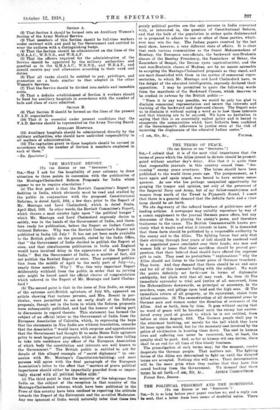THE MONTAGU REPORT.
[To THE EDITOR OF THE " SPECTATOR."1
SIR,—May I ask for the hospitality of your columns to draw attention ta three points in connexion -with the publication of the Montagu-Chelmsford Reform. Propoeals for India which appear to me to require elucidation ?
(a) The first point is that the Rowlett Committee's Report on Sedition in India, which obviously must be read and studied by the public ia conjunction with the proposed Constitutional Reforms, is dated April, 1918, a few days prior to the Report of Mr. Montagu and Lord Chelmsford. which is dated Simla, April 22nd, 1918. In other words, the Rowlett Committee's Report, which throws a most sinister light upon "the political hunger" which Mr. Montagu and Lord Chelmsford expressly desire to satisfy, was in the hands of the Government of India, and there- fore ready for publication, before the Report on Indian Consti- tutional Reforms. Why was the Rowlett Committee's Report not published in India till July ? It has not yet been made available to the British public on the grounds, stated by the India Office, that "the Government of India decided to publish the Report at once,, and that _simultaneous publication in India and England would have involved delay in the appearance of the Report in India." But the Government of India, as a matter of fact, did not publish the Rowlett Report at once. They postponed publica- tion from the middle of April to the early part of July—i.e., nearly three months. Why ? Was this very important Report deliberately withheld from -the public in order that no jarring note might be heard amid the official chorus of congratulation which ushered in the Report of Mr. Montagu and Lord Chelms- ford?
(b) The second point is that in the issue of New India, an organ of the extreme anti-British agitators, of July 8th, appeared an article showing that various persons, and Mrs. Bement in par- ticular, were permitted to see an early draft of the Reform proposals, though not in the form in which the Reform proposals were subsequently published, and had the honour of taking part in discussions in regard thereto. This statement has formed the subject of an official letter to the Government of India, from the European Association of Calcutta, which, in expressing the hal:is that the statements in New India are without foundation, remarks that the Association "would learn with surprise and apprehension that the Government had thought fit to make Horne Rule agitators privy to most important proposals, while at the same time failing to take into confidence any officer of the European Association of which body the constitution and interests are well known to the Government." The British public is entitled to ask for details of this alleged example of "secret diplomacy" in con- nexion with Mr. Montagu's Constitution-building; and most persons will agree with the final paragraph of the European Association's letter to the °fleet that "matters of grave political importance should either be impartially guarded from or impar- tially *hared with all political bodieg alike."
(c) The third point is that the majority of the telegrams from India on the subject of the reception in that country of the Montagu-Chelmeford reforms which have been published in the Press of this country have been confined to reporting the attitude towards the Report of the Extremists and the so-called Moderates. Any one ignorant of India would naturally infer that these two purely political parties are the only persons in India concerned with, or interested in, the question of Constitutional Reform, and that the bulk of the population is either quite disinterested or is prepared to adhere to one or other of these parties, which- ever may win the day. The Indian papers received by the last mail show, however, a very different state of affairs. It is clear that such various communities as the Sunni Mohammedans of Bombay, the European non-officials, the backward non-Brahmin classes of the Bombay Presidency, the Zamindars of Behar, the Zamindars of Bengal, the Deccan ryots (agriculturists), and the vast non-Brahmin classes of Madras, are by no means agreeable to accepting the Montagu-Chelmsford proposals as they stand, and are most dissatisfied with them in the matter of communal repre- sentation, to which Mr. Montagu and Lord Chelmsford have, to the delight of the educated intelligentsia, expressly declared their opposition. I may be permitted to quote the following words from the manifesto of the Backward Classes. which deserves to be studied in extenso by the British public :— " Were it in any way possible, we would be only toe glad to disclaim communal representation and secure the interests and training of the backward and depressed classes. The Report asks us to disclaim- it without saying a word as to how those interests and that training are to be secured. We have no hesitation in saying that this is an essentially unjust policy and is bound to exasperate the communities which have hitherto been confident of the Government's adherence to justice even at the risk of incurring the displeasure of the educated Indian castes."


































 Previous page
Previous page